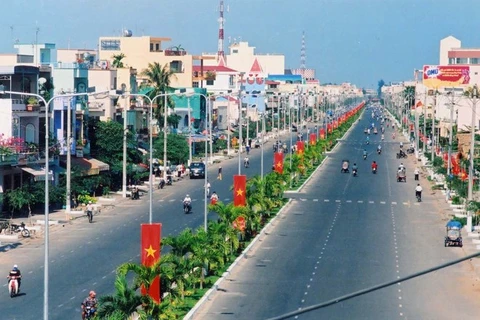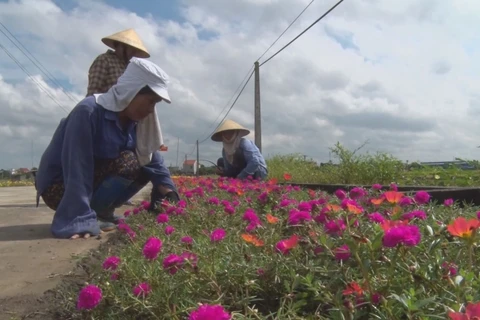 Farmers in Thach Van Commune, Thach Ha district in the central province of Ha Tinh, hard at work (Photo: VNA)
Farmers in Thach Van Commune, Thach Ha district in the central province of Ha Tinh, hard at work (Photo: VNA)Ha Tinh (VNA) - The central province of Ha Tinh has been through its share of difficulties, but after six years of building new-style rural areas, the province is full of fields and gardens of high economic value.
One of the goals the province has introduced for new-style rural area building is that 70 percent of fences in the areas must be covered with green trees.
The province set the goal because in many other areas, concrete is used to build fences, which while being cleaner and sturdier, lack rural beauty. Thus the province uses the goal to ensure the rural landscape and economic value at the same time.
Ngo Viet Ha, Secretary of the Party Committee of Huong Tra commune in Huong Khe district, said that after years of setting up new-style rural areas, local residents are reaping the rewards.
Green trees are planted along the roads, with trees such as paper flowers, rose-mallows, loopah trees and gourd trees resplendent.
“Both local residents and authorities are happy and enthusiastic to work,” said Ha.
Remembering the very first days of the programme, Ha said that local authorities met many obstacles.
“Many households did not understand the programme so they refused our requests.
Village and commune managers educated and instructed them, so at last, they agreed and followed our directions,” said Ha.
Dinh Phuc Tan, Secretary of the Nam Tra village Party Committee, said that now Nam Tra village has 20 model gardens. Every year, the village welcomes hundreds of delegations from other provinces nationwide to visit and learn from its experiences.
The Yen My village in Cam Yen commune, Cam Xuyen district is also a good example of the work.
Nguyen Quoc Sy, Chairman of the Cam Yên commune People’s Committee, said that 70 out of 120 gardens in the village are model gardens, and the rest are green and clean.
“When local residents have some work far from home, they can water their gardens via an automatic system controlled by mobile phone,” he said.
Sy added that on the average, each model garden brought 71-100 million VND (3,100-4,400 USD) per year. Most of them plant vegetables and fruit trees.
One typical household in Yen My village is Nguyen Thi Thuan’s family whose income exceeds 100 million VND (4,400 USD) per year thanks to growing oranges.
Thuan said that earlier she planted different kinds of trees in the garden, with her income unstable. Since she became a model garden, the garden was more beautiful and brought better income.
At present more than 7,500 households in the province have registered to build model gardens, of which 1,725 reached norms of model gardens and enjoy supportive policies from provincial authorities. It is expected that by the end of this year, 1,000 more gardens will qualify.
Tran Huy Oanh, office manager of the Ha Tinh New-Style Rural Areas Operation Department, said that the province recognised seven communes as new-style rural areas in 2013, but the common landscape in the province was not good.
Thus the provincial authorities planned to set up model of new-style rural areas in three villages, and provide each village 300 million VND (13,300 USD) for the effort.
The movement of setting up new-style rural areas has spread rapidly. In several villages such as Tan An, Yen My and Hong Linh, local residents are determined to establish such gardens.
Duong Kim Hue, Secretary of the Party committee of Tuong Son commune, Thach Ha district said that the commune had six co-operatives, 21 working teams and four enterprises running effectively so they worked with local residents in manufacturing.
“It is the most important factor helping model gardens sell their products, and therefore be stable,” said Hue.
Ngo Tat Thang, Deputy Director of the National New-Style Rural Areas Operation Department, said the model gardens initiative was a success of Ha Tinh province.
“The model focuses on micro manufacture and being suitable with rural areas,” he said.
“Thanks to re-organising their lives, local residents will better understand their role in the national target programme on setting up new-style rural areas,” said Thang.
Thang said the province’s best achievement was that, via the model gardens, local residents’ health, awareness and living standards were improved.
Workers and managers from provincial to village level have also worked together so their guidance and instruction to residents is clear.
“Thus local residents participated in the programme enthusiastically and believe in its results. And as a result, the province has made outstanding achievements,” said Thang.-VNA
VNA
























